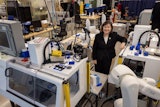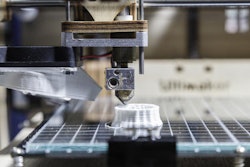Artificial Intelligence (AI) is always a practical failure. This is because, by the time that it is successfully applied, it is always called something else. Examples include Google searches, voice recognition and that car navigation "app" on your mobile phone.
And so it is in manufacturing, where some practical applications of AI methods include:
- Dynamically rescheduling production operations as new orders arrive and problems arise on the production floor.
- Assisting materials and production managers with deciding what materials to order and what to make and when.
- Warning material handlers and production workers if they are about to pick or use wrong or defective materials for a job.
- Alerting managers when there are production or materials supply issues they need to pay attention to, such as production jobs running too long or materials needing replenishing.
- Preventing barcode labeling mistakes by automatically selecting and generating the correct label based on such factors as customer, part, container and destination.
The practical use of AI methods makes Manufacturing Execution Systems (MES), Work-in-Process (WIP) tracking and Warehouse Management Systems (WMS) quicker to implement and much simpler to use, but these are never called AI systems as this is "scary" to most people in manufacturing.
Most users of these systems don't realize they are using AI. All they know is that that the system is enabling them to simply capture and view the needed production and inventory tracking data in real-time. And, in return, it is providing them with guidance as to what to do next and warnings when problems are about to arise.
As with mobile phone "apps" based on AI, the key to deployment of many of these AI methods is mobile devices. We are seeing a transition from production data capture being performed at fixed work stations to each production worker being given their own personal mobile device through which to capture and view production data and receive instructions and warnings.
With the application of AI methods, the question arises as to whether AI will take over the running of manufacturing operations, obsoleting the need for managers and reducing workers to human automatons?
The answer is emphatically NO, because of the "dirty little secret" of AI, which is that AI is great at applying "specific knowledge" and very poor at applying "general knowledge". Specific knowledge relates to rules, decision trees and algorithms that the system uses to process large amounts of data come up with specific recommendations or warnings. Whereas, general knowledge relates to general situational awareness.
Thus an AI system may use specific knowledge to develop a plan to have an employee work on a specific important job based on the needed materials being expected to arrive a couple of hours before they will finish work on his current job. But his manager may have general knowledge that there has just been a major traffic accident on the delivery route, such that the expected delivery time for the needed materials will be delayed for several hours, and thus the employee should work on another job when he finishes his current job.
For this reason, wherever possible, we use specific knowledge-based AI methods to provide advice or warnings to people but allow people to make the choice, such as to which job to work on or whether to ignore a warning, rather than having the AI system force people to work or behave in a specific way. This collaboration of man and machine then makes use of the best general knowledge and problem solving capabilities of people and the specific knowledge capabilities of computers to rapidly process large amounts of data in real-time.
Another area where AI is playing an increasingly important role is in automating the exchange of data between systems used by different departments within a manufacturing organization. Production departments are no longer silos of information. Instead, today, an MES system needs to import order information from sales and E-Commerce systems and exchange information with supply chain systems, as well as to exchange data with ERP, accounting and human resources systems.
These information exchanges are not simple data exchanges but rather involve interpreting the data from the systems used by one department or silo of information into information that is meaningful to the recipient department or silo. AI can play a major role in interpreting source data updates from a large number of systems and using its specific knowledge to automatically extract and interpret information and place it into a target system in a form that is meaningful to its recipients.
This can enable information to automatically flow seamlessly in real-time from one department to another without the use of paper forms, duplicate data entry, mistakes in transferring data or holding endless "coordination" meetings.
The specific knowledge based used by manufacturing systems is typically coded in the form of rules or algorithms built into the software. This knowledge-base can be tailored to the specific needs of each individual manufacturing company or even department by importing the parameters of these rules and algorithms in the form of Excel spreadsheets. This enables manufacturers to program the AI rules and algorithms without realizing that they are doing anything as scary as programming an AI based system. All they think they are doing is setting up the system's parameters for their specific application.
This takes advantage of the fact that the rules and algorithms, such as for Lean manufacturing principles, are applicable across a wide variety of industries, but that the parameters of the rules and algorithms are different for each manufacturer. This approach enables rapid deployment of manufacturing operations tracking and management systems using standard software that works off-the-shelf to provide most, if not all, of the code needed for a specific application, and that can be easily tailored by manufacturers to meet their specific business requirements.
In summary, AI is already starting to play a major role in manufacturing software, but it will not be called AI. Instead it is, and will increasingly be, silently embedded into MES, WMS and WIP tracking systems to make them quicker to deploy and easier to use and automatically exchange information with other systems.
As a result Artificial Intelligence, by name, will fail to be used in manufacturing but AI methods will be everywhere, even if you don't know that you are using them.
Dr. Peter Green is a systems architect and one of the founders of BellHawk Systems.























